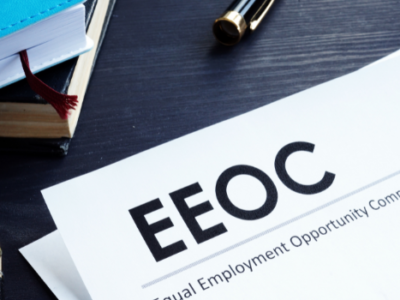What To Expect When the EEOC Comes Calling: An Overview for Business Owners of What to Expect if a Disgruntled Employee Files a Charge of Discrimination with the EEOC
February 18. 2022
By David L. Walker, Jr.
The Equal Employment Opportunity Commission (“EEOC”) was established in 1965, and it was created for the stated purpose of taking “affirmative action” to ensure that job applicants and employees are protected from workplace discrimination. In most instances, if an individual claims to be the victim of workplace discrimination, that person is required to file a claim with the EEOC before he or she may file a lawsuit in his or her individual capacity.
In many instances, the employer’s first notice of the claim of discrimination will come in the form of a Notice of Charge of Discrimination, by which the EEOC provides the employer with very basic information related to the claim, including the claimant’s identity and a generalized description of the alleged discriminatory act(s). An employer who receives a Notice of Charge may also be asked to provide information to the EEOC, and, in many instances, the EEOC will also request that the employer provide a Position Statement.
Regardless of the perceived merits of the claim, when a Position Statement is requested, it is critical to provide a diligent response. This includes taking steps to preserve evidence, interviewing witnesses who may have material information related to the claim, and preserving attorney-client privileges and attorney work product privileges, both of which are key to ensuring that a thorough and complete investigation can be accomplished.
Once a well-conceived and thorough investigation has been conducted, the Position Statement should be prepared and presented to the EEOC to highlight the material facts, statutes, regulations, and jurisprudence that are relevant to the employer’s defense. It is not sufficient to merely write a narrative style discourse that only presents the employer’s one-sided view of why it should prevail; rather, the Position Statement should take into account the strengths and weaknesses of an employer’s position, and, where appropriate, include a protocol for addressing and correcting situations if the investigation conclusively reveals that documented acts of discrimination have occurred in the workplace.
An EEOC claim is a serious matter that can present significant pecuniary threats to a business’s viability. As such, it is critical that business owners mobilize to respond with a well-executed strategy to limit or eliminate the threat posed by the claim.
David L. Walker, Jr. is a partner with Flint, Connolly & Walker, LLP. He focuses his legal practice to collaborate with business owners, mid-sized and closely held corporations, as well as real estate owners, developers, and contractors.

